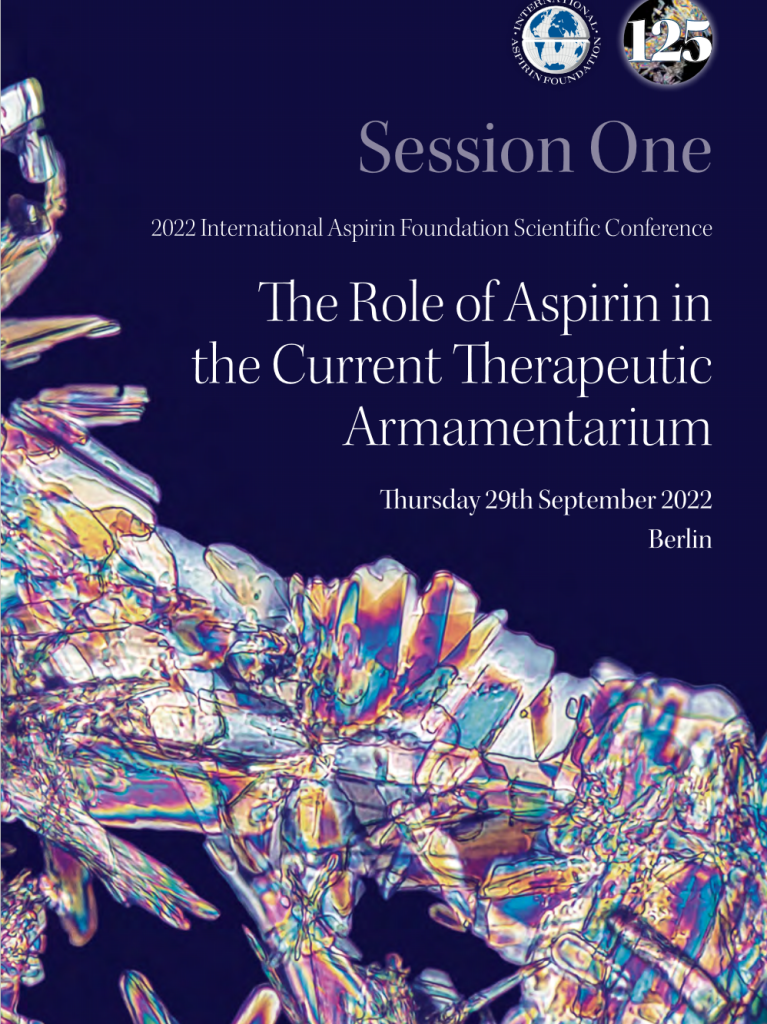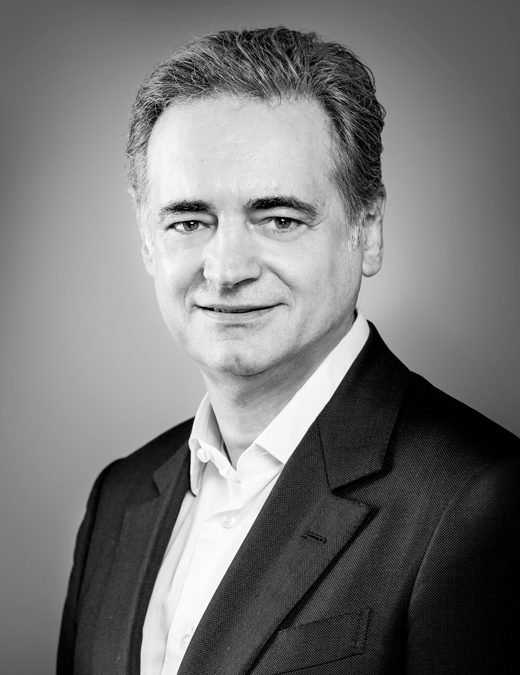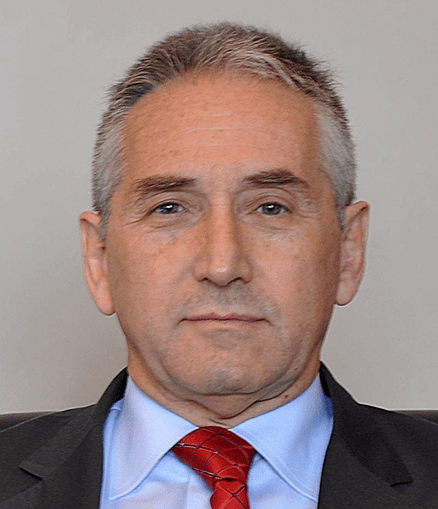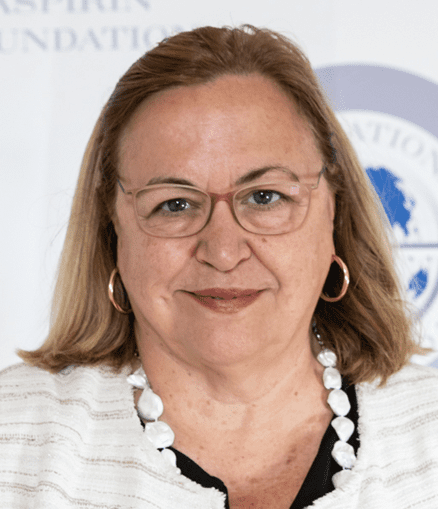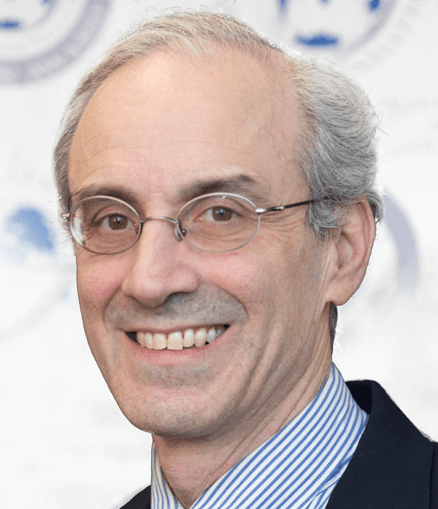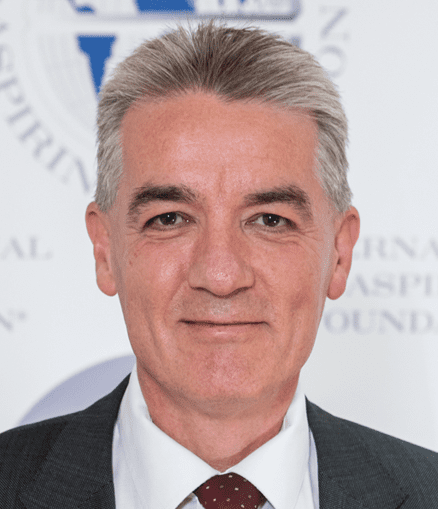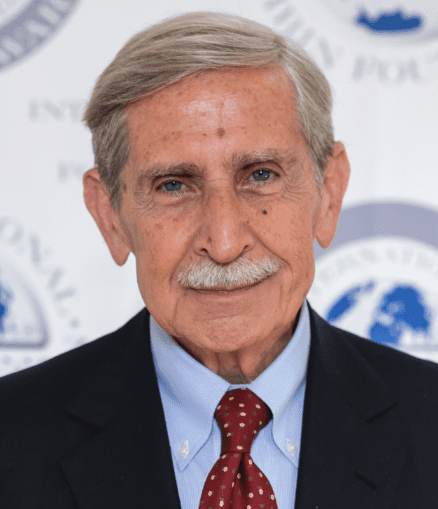The Role of Aspirin in the Current Therapeutic Armamentarium
125 years of aspirin-inspired research
Professor Carlo Patrono (Italy)
The past fifty years of aspirin were presented with a particular focus on the research leading to its utilisation as an antiplatelet medication and its important role in reducing cardiovascular events. Aspirin continues to keep the scientific community interested and has a class one A recommendation for patients with cardiovascular disease (CVD), in the acute setting and long-term secondary prevention.
Aspirin has a unique mechanism of action because it permanently inactivates platelet cyclooxygenase (COX)-1 through selective acetylation of a single serine residue near the catalytic site of the enzyme. COX-1 normally catalyses the conversion of arachidonic acid to prostaglandin (PG) G2, but when the enzyme is acetylated by aspirin it loses its catalytic activity and thromboxane synthesis is suppressed. The so calle “aspirin dilemma” was that aspirin inhibits both the synthesis of a pro-aggregatory and vasoconstrictor substance, thromboxane (TX)A2, and of an endogenous antiplatelet and valodilator autacoid, i.e., prostacyclin (PGI2).
In 1982 Carlo Patrono and his group published work, in healthy subjects, demonstrating log-linear inhibition of platelet TXA2 production after single oral doses of aspirin in the range 10-100 mg.1 Moreover, repeated daily administration of aspirin gave a cumulative antiplatelet response with a 30-mg dose resulting in complete suppression of platelet COX-1 activity.1 Later work showed that the cumulative inactivation of platelet COX-1 by daily dosing of aspirin enhanced its potency 8-fold, with saturable inhibition of TXA2 production at doses <<100 mg.2 Garret FitzGerald also published work showing that both prostacyclin and thromboxane are differentially suppressed with cumulative dosing of aspirin in healthy subjects3.
These findings led a trio of brilliant investigators at the University of Oxford, Sir Richard Peto, Sir Rory Collins and Professor Peter Sleight to launch a very large, placebo- controlled, randomized trial, ISIS-2.4 This trial, published in 1988, established low-dose aspirin as a life-saving drug in the setting of an acute myocardial infarction (MI).
In 2020 Tom Meade, Jan van Gijn, Lars Wallentin and Bo Norrving shared the IAF Senior Science Award for their pioneer trials of low-dose aspirin (30 to 75 mg daily) for the prevention of coronary and cerebrovascular events.
Aspirin has now been shown to be effective in preventing serious vascular events at low doses in a variety of vascular disorders: hypertension (75 mg), stable angina (75 mg), unstable angina (75 mg), acute MI (160 mg), TIA and ischemic stroke (50-75 mg), severe carotid artery stenosis (81mg) and acute ischemic stroke (160 mg).5 Work by Colin Baigent, who coordinated the Antithrombotic Trialists Collaboration, through a metanalysis of aspirin trials in high-risk patients, showed no evidence of a dose-response relationship for the antithrombotic effect of aspirin, consistent with saturability of platelet COX-1 inhibition at low aspirin doses.6
Blood platelets have a multifaceted role in human physiology and pathophysiology including:
- Primary haemostasis: vascular integrity, cessation of bleeding
- Tissue repair
- Angiogenesis
- Innate and adaptive immunity
- Embryonic development
- Arterial thrombosis
- Inflammation
- Atherosclerosis
- Cancer metastasis
In addition to its role in Cardiology, interest continues to thrive in many of the above areas for aspirin and disease prevention.
Aspirin is now in its 125th year and continues to be a cornerstone of antiplatelet therapy for cardiovascular prevention. Newer antiplatelet agents are also available but have not convincingly demonstrated better safety or efficacy. Combination therapy, with low-dose aspirin and other antiplatelet, e.g., P2Y12 receptor blocker or anticoagulant drug, is now used when a more effective antithrombotic strategy is required for those at higher risk.7
References
- Patrignani P, Filabozzi P and Patrono C. Selective cumulative inhibition of platelet thromboxane production by low-dose aspirin in healthy subjects. J.Clin.Invest 1982; 69; 1366-1372
- Patrono C, Ciabattoni G, Patrignani P et al. Clinical pharmacology of platelet cyclooxygenase inhibition. Circulation 1985 72(6):1177-84
- FitzGerald GA, Oates JA, Hawiger R et al. endogenous biosynthesis of prostacyclin and thromboxane and platelet function during chronic administration of aspirin in man. J Clin Invest. 1983;71(3):676-688
- ISIS-2 Collaborative Group Randomised trial of intravenous streptokinase, oral aspirin both or neither among 17187 cases of suspected acute myocardial infarction: ISIS-2 Lancet 1988 332;(8607) 349-360
- Patrono C, Baigent C, Hirsh J et al. Antiplatelet drugs: American College of Chest Physicians Evidence – Based Clinical Practice Guidelines (8th Edition) Chest 2008 ;133 (6Suppl):199s-233S
- Antithrombotic Trialists’ Collaboration Collaborative meta-analysis of randomised trials of antiplatelet therapy for prevention of death, myocardial infarction and stroke in high-risk patients. BMJ 2002; 324:71-86
- Patrono C. Fifty years with aspirin and platelets. Br J Pharmacol 2022; 1-19DOI; 10.1111/bph.15966
The place of aspirin in Cardiology: Treatment vs Prevention
Professor J Michael Gaziano (USA)
The role of aspirin in acute treatment and secondary prevention has been widely studied with over 400 large scale trials that looked at the use of aspirin in acute settings and among individuals with a variety of manifestations of atherosclerotic disease, testing the hypothesis that platelet inhibition with aspirin will lower the risk in acute CVD settings and subsequently among those with known atherosclerotic disease (prior MI or stoke, CAD, TIA, or peripheral artery disease).
The acute treatment trial ISIS-2 changed clinical practice by showing that 162 mg of aspirin given at the time of an acute MI resulted in a 23% reduction of death or MI, an effect that persisted for years. The absolute benefit was 2.4% and the NNT= approximately 40. There was also no apparent bleeding risk giving a favourable risk benefit ratio1.
In secondary prevention, the risk of a second CVD event is very high with a 40% chance of a second event over 10 years and a lifetime risk of 80%. In this setting, aspirin has a clear role. Here the 25% relative risk reducing intervention of aspirin results in the secondary prevention scenario having a NNT = 10.
The assessment of the benefits of aspirin in primary prevention are more complicated because absolute risks of vascular events are lower than in secondary prevention while complication rates are comparable. For example, with a 10- year risk of a CVD event of 1%, a 25% relative risk reduction strategy would result in an estimated NNT = 400. Therefore, the study of aspirin in primary prevention requires much larger studies for longer periods of time than secondary prevention studies.
Fifteen large trials have explored the role of aspirin in primary prevention among those with no known CVD. Aspirin has a lesser effect in this group and much longer trials are needed to see a benefit. In the Physician’s Health Study2 with 11037 taking aspirin and 11034 taking placebo a 44% reduction in first MI was found in the aspirin group.
Whilst the biology of the first CVD event is likely to be the same as a second event, the observed efficacy of aspirin in primary prevention trials appears to be affected by lower compliance with the study medication over the longer time frame of these trials. As time has gone on it has been harder to do primary prevention trails and get the same efficacy as the early trails, because the overall events are less now due to an improvement in CVD risk reduction strategies.
Several primary prevention trials were presented in 2018 and although there has been a lot of discussion over the results:
- The ASCEND study showed that aspirin works the same in people with diabetes as those without3
- ASPREE showed that aspirin does not prevent the combined outcome of dementia, death and disability4
- ARRIVE was not successful in assessing the impact of aspirin in those at moderate risk and had attempted to recruit a higher risk group of patients.5
Doing placebo-controlled trials of aspirin is challenging in the 21st century. In general, results from the three trials are consistent with the previous primary studies that demonstrate aspirin’s ability to lower the risk of first major CVD event with more impact on MI and to increase the risk of bleeding dominated by GI bleeding with no difference in fatal bleeding.
Compliance issues have impacted the ability to demonstrate the efficacy of low-dose aspirin in the primary prevention setting but the per protocol analysis, of people who maintained the aspirin therapy, in ARRIVE is similar to the Physicians Health study undertaken in the 1990s. Interestingly, when these new results were pooled in meta- analysis the overall data didn’t change.
Clinically, there are three potential strategies for improving the benefit/risk profile of aspirin in primary prevention:
- Improve risk assessment and optimize the aspirin regimen
- Include the potential impact of low-dose aspirin on non- vascular outcomes (e.g., colorectal cancer (CRC)
- Improve the safety profile of low-dose aspirin by increasing the use of gastroprotectant agents e.g., PPIs particularly in the elderly.
In summary, low-dose aspirin is universally recommended for acute treatment and secondary prevention of CVD events, it is also generally recommended for those at higher risk with diabetes. It can also be considered in primary prevention for those with a high risk of CVD. The use of aspirin remains a decision that should involve a discussion between a clinician and a patient given the need to weigh the CV and cancer benefits against the bleeding risk, patient’s preferences, costs and other factors.
References
- ISIS-2 Collaborative group Randomised trial of intravenous streptokinase, oral aspirin, both , or neither among 17 187 cases of suspected acute myocardial infarction: ISIS-2. Lancet 1998; 332 (8607) 349-360
- Steering Committee of the Physicians’ Health Study Research Group. Final report on the aspirin component of the ongoing Physicians’ Health Study. N Engl J Med. 1989 Jul 20;321(3):129-35. doi: 10.1056/NEJM198907203210301. PMID: 2664509
- Bowman L, Mafham M, Stevens W, Haynes R, Aung T, Chen F, Buck G, Collins R, Armitage J; ASCEND Study Collaborative Group. ASCEND: A Study of Cardiovascular Events iN Diabetes: Characteristics of a randomized trial of aspirin and of omega-3 fatty acid supplementation in 15,480 people with diabetes. Am Heart J. 2018 Apr;198:135-144. doi: 10.1016/j. ahj.2017.12.006. Epub 2017 Dec 24. PMID: 29653635; PMCID: PMC5971211
- McNeil j, Nelson M, Woods R et al. Effect of aspirin on all-cause mortality in the healthy elderly. N Engl J Med 2018; 379:1519- 1528
- Gaziano JM, Brotons C, Coppolecchia R et al. Use of aspirin to reduce risk of initial vascular events in patients at moderate risk of cardiovascular disease (ARRIVE): A randomised double-blind, placebo-controlled trial. Lancet 2018 392 (10152); 1036-1046
Round Table Discussion
Professors’ Junbo Ge (China), Jean-Phillipe Collet (France), Carlo Patrono (Italy), J Michael Gaziano (USA), Bianca Rocca (Italy) and Gemma Vilahur (Spain) Aspirin is regularly used in the Chinese adult population, but the dosage used is smaller in the elderly and in low weight women where 25mg or 50 mg doses are selected instead of the usual 75-100 mg daily dose recommended for those of a more standard weight. Helicobacter pylori has been identified as an important factor in the Chinese population contributing to bleeding risk with aspirin and efforts are being made to investigate and treat this infection. Factors such as age or having comorbidities and other medications e.g., anticoagulants for atrial fibrillation can complicate the picture. It is important to find ways to identify the thrombus prone population and the use of calcium scores may help with this.
From France a view was raised that the distinction between primary and secondary CVD prevention was artificial and that instead a linear increased risk should be considered with the same risk scale used to define aspirin strategy. Getting the balance between risk and benefit right can be complex and better use of tools is required to do this accurately, for example using imaging to identify high risk patients.
Other discussion looked at how CVD risk, as a whole, is better controlled now than in the 1990s, for example, lipid control; blood pressure control; and aggressive management of familial hypercholesterolaemia.
Health care providers need to identify those patients most likely to benefit from aspirin therapy by utilising risk assessment tools and empowering patients with the knowledge of aspirins preventative effects.

